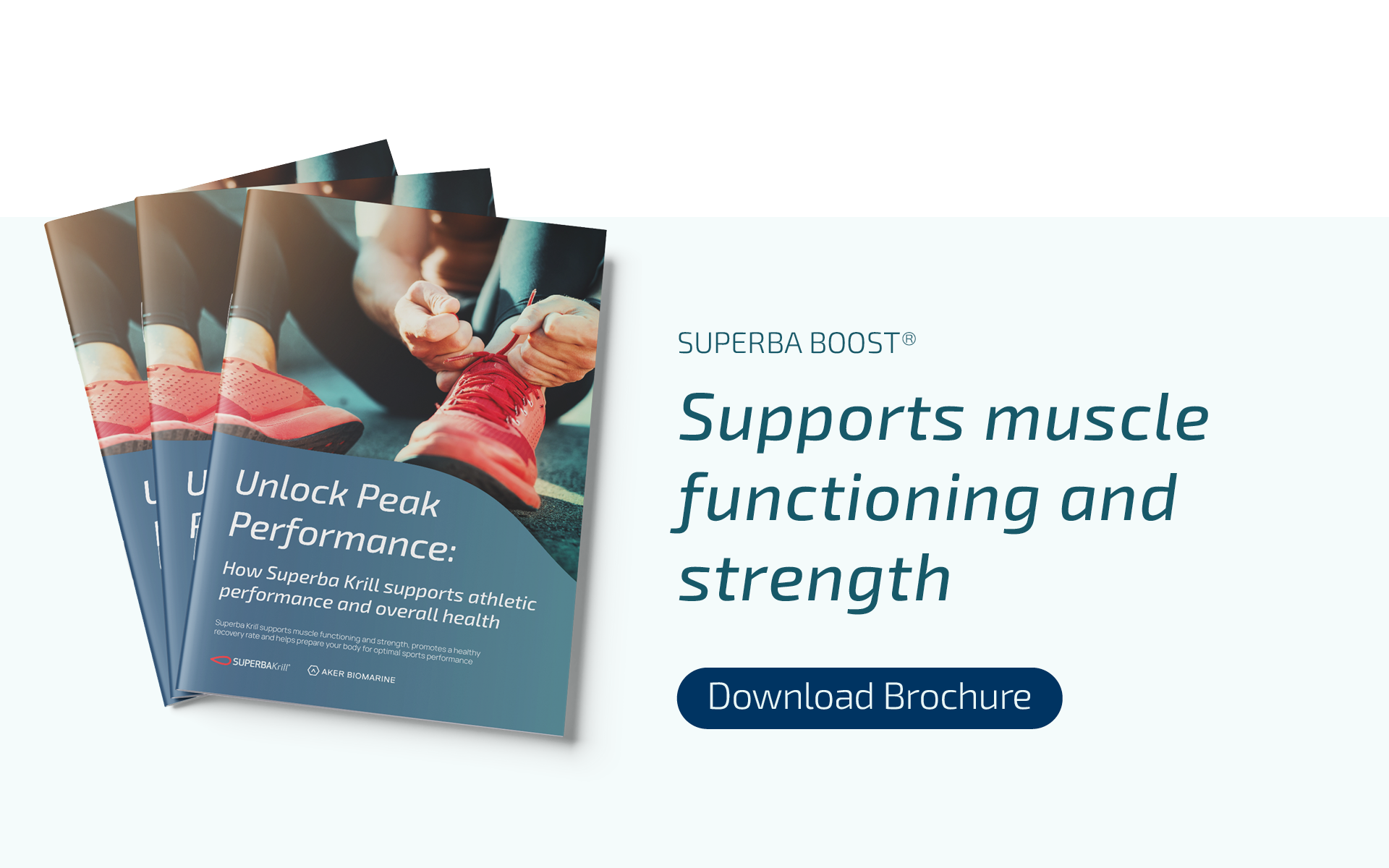Scientific studies show that the omega-3 and choline naturally found in krill oil can benefit sports performance and recovery.
Our fitness has become serious business, and today we know more than ever about what it takes to keep our bodies healthy and thriving. Social media has given center stage to emerging fitness trends, while gym memberships are reportedly on the rise and sports nutrition has entered the mainstream.
The growing focus on sports nutrition has led athletes of all ages and abilities to seek out the right nutrients to enhance their performance and recovery.
Krill oil is a key part of a sports nutrition strategy
Sports nutrition is all about hydrating and fueling your body to be at its best. In addition to a healthy diet, many athletes turn to supplements, such as krill oil, to ensure that the body benefits from a steady stream of essential nutrients. Krill oil can be an effective part of a nutritional strategy for athletes who aim to speed up their recovery and maintain muscle function.
In the more extreme sports, such as power training and triathlon, the body can undergo extreme stress and recovery can be challenging without a proper nutrition strategy. The question is, how exactly does krill oil impact athletes in these situations?
There have been several scientific studies based on this very question. Most recently, researchers from Cien por Cien Natural, Aker BioMarine and Centre d’Alt Rendiment (CAR) ran a study with a group of intense power training athletes in Spain. The study ran for 12-weeks so that the team could analyze how the power trainers responded to krill oil versus a placebo. The conclusion, now published in Nutrients, was that krill oil was an effective way to increase the omega-3 and choline concentrations in the athletes.
Krill oil phospholipids boost omega-3 index in athletes
Omega-3s are the fatty acids that your body needs to keep inflammation in check. Our modern diet is full of another kind of fatty acids, omega-6, which tend to cause more inflammation. We need both, but the body performs better when these two are in balance. When comparing these levels, we are analyzing what’s called the omega-6 to omega-3 ratio.
At the start of the study, 82% of the participating athletes’ omega-3 levels were below the recommended levels. After 12 weeks of supplementing with krill oil, the power trainers showed a significant increase in the omega-3 levels and a much more balanced omega-6 to omega-3 ratio compared to the control group.
Choline plays a key role in muscle function among power trainers
The power training study in Spain also investigated another key nutrient that krill oil delivered to these high intensity athletes: choline, and showed that 12 weeks of krill oil supplementation increased plasma choline concentrations in the krill oil group in comparison to a decrease in the placebo group.
Choline is important for proper muscle function, as well as neurotransmitter production and cell signaling in the muscles – all of which is critical in sports performance, and the choline concentration in plasma is known to decrease during strenuous exercise. The U.S. Department of Health reports that 90% of the American population lacks the recommended amount of choline in the diet. Low levels of choline can decrease the neurotransmitter production, which makes athletes more prone to muscle damage. Simply put, without enough choline, sports performance may suffer.
“This study had significant learnings for power trainers who are looking to ramp up their nutrition game. The case for krill oil is a strong one when you reflect on the results, as it was shown through this trial to be an effective nutritional strategy to increase omega-3 index, recover choline concentrations in the body and address oxidative stress after power training sessions, leading to more optimal performance,” says Line Johansen, SVP Human Health & Nutrition R&D in Aker BioMarine.
Triathletes test krill oil supplements ahead of one of the world’s toughest races
Like the power training study, another study was conducted by Aker BioMarine and Oslo University Hospital. Together, the researchers wanted to test krill oil’s impact on participants of the Norsemen Xtreme Triathlon, a race that’s considered one of the world’s toughest, and the Sprint/Olympic-distance Oslo Triathlon.
A group participating triathletes tested krill oil as part of their nutritional plan for the race. By consuming krill oil prior the race, the competitors exhibited higher overall levels of choline at the start. During the race, the choline levels among all athletes were depleted by 15-34%, with the more pronounced decrease (34%) observed in the Ironman-distance Norseman Xtreme triathlon, but the researchers observed significantly higher concentrations of choline among the groups consuming krill oil compared to the control group. The krill oil group also showed a significantly greater increase in serum choline following the race completion.
Krill oil delivers the omega-3 and choline needed for optimal sports performance
There’s an old saying that “we are what we eat”, and in the world of sports, this very much applies. Our body needs the right nutrients as it undergoes stress, exertion and even exhaustion. Any viable sports nutrition strategy must ensure that every supplement taken has a clear and beneficial effect, backed by scientific research, and tested on athletes.
“We see krill oil phospholipids as an impactful addition to any athlete’s nutritional plan, whether you’re a weekend warrior or training for a marathon – the benefits are the same,” says Line Johnsen. “You will perform better, recover faster, and reduce muscle fatigue thanks to that daily dose of omega-3 and choline that krill oil delivers in the beneficial phopholipid form”
Read more about the krill oil benefits for sports nutrition and performance in this brochure below:

